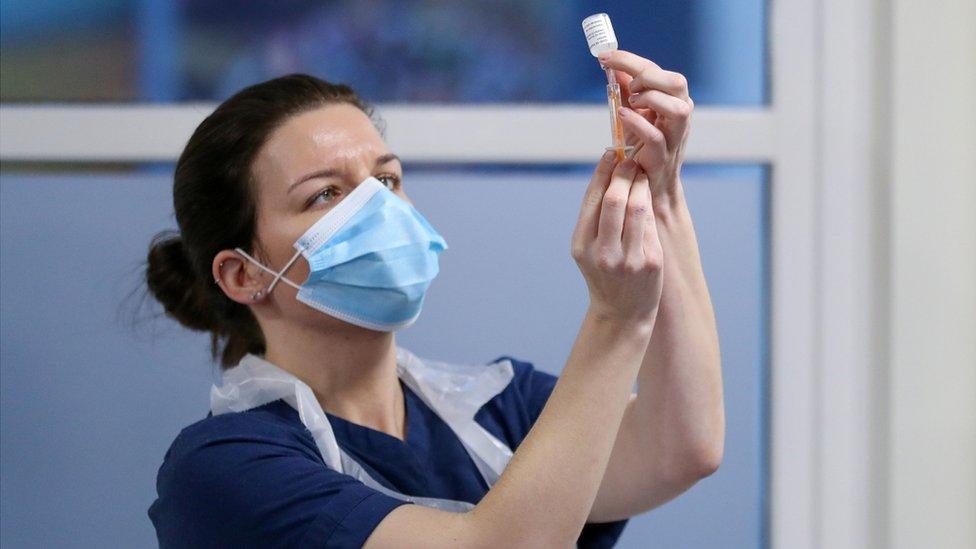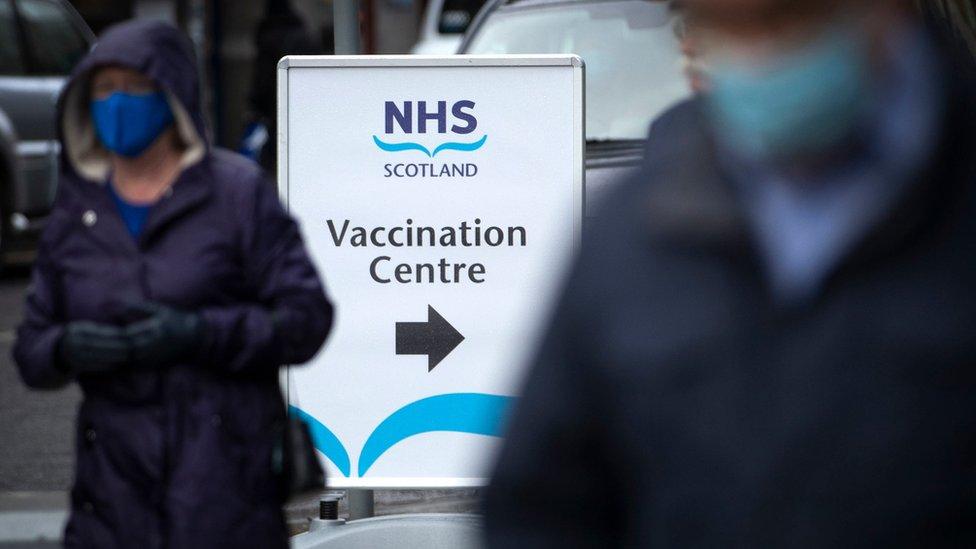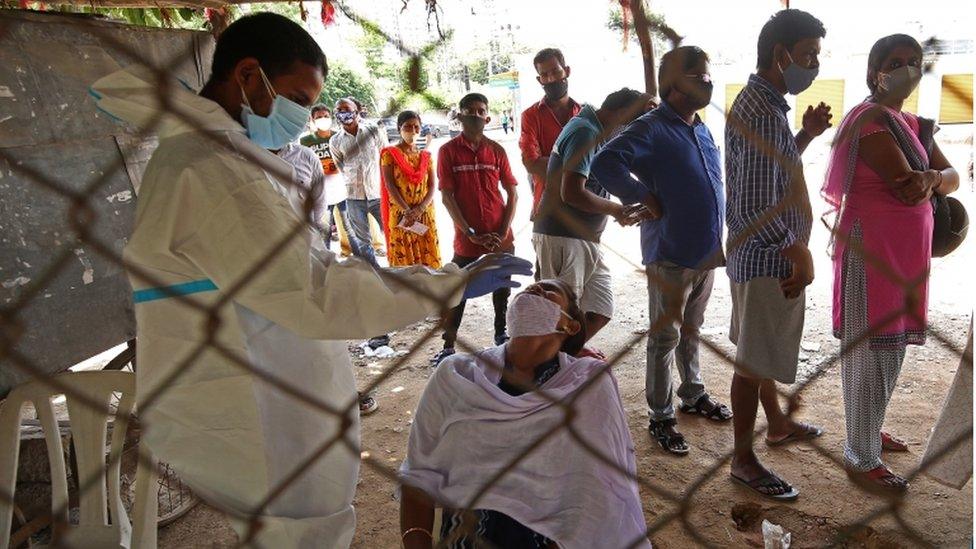Covid: Scotland would 'move quickly' to vaccinate children
- Published
- comments

More than half of Scotland's adult population has had both doses of a Covid vaccine
Scotland will start to vaccinate children aged between 12 and 15 as quickly as possible if experts recommend it, Nicola Sturgeon has said.
The Pfizer-BionTech vaccine was approved for use among the age group by the UK's medicine regulator last week.
The Scottish government is now awaiting advice from the Joint Committee on Vaccination and Immunization on whether it should begin vaccinating children.
Ms Sturgeon said the focus remained on getting all adults vaccinated.
But she told the Scottish Parliament that if the JCVI recommends the use of the vaccine for children over the age of 12, the country would "move as quickly as possible to implement the advice".
The first minister added: "It is vital that we rely on expert advice in all of our vaccination decisions.
"However, vaccination may well be an important way of giving children greater protection, minimising any further disruption to schooling, and further reducing community transmission of the virus."
Ms Sturgeon also insisted that the decision was not simply a choice between "vaccinating children and playing our part in global vaccination".
More than half of Scotland's adult population has now had both doses of a Covid vaccine - with the total number standing at 2,282,203.

Pfizer has said its vaccine trials had shown 100% efficacy and a strong immune response in children between 12 and 15, and that the vaccine was safe with no unusual side-effects.
Its use among children in the UK was approved by the MHRA on Friday of last week, with the regulator saying it had carried out a "rigorous review" which showed the vaccine was safe and effective in adolescents.
The Joint Committee on Vaccination and Immunisation (JCVI) must now advise governments on whether this age group should be vaccinated as part of the UK rollout.
The UK government has also said it will be guided by expert advise from the JCVI, and that any decision would be "clinically based".
And it has said that the UK has enough supplies to vaccinate children if the move was recommended by the JCVI.
But some experts have questioned whether it is morally right to vaccinate children - who have an extremely low risk of becoming seriously ill or dying from Covid - in wealthy countries such as the UK rather than donating the extra doses to the rest of the world.

What do you think about vaccinating teenagers? Would you like to see young people aged 12-15 vaccinated before the beginning of the next school term? Please share your stories and pictures with us.
You can now get in touch with BBC Scotland on the phone messaging service, WhatsApp.
To start using the app, simply download WhatsApp on to your smartphone free from the internet, external.
Then add our WhatsApp number +44 7902 704679, external to your phone's contact list.
Please make sure you read our terms of use and privacy policy.


Some experts want extra vaccine doses to be donated to less wealthy countries rather than used to immunise teenagers
The World Health Organization has already called on wealthy countries to postpone any plans to immunise children.
And Linda Bauld, professor of public health at the University of Edinburgh, told BBC Scotland at the weekend that she hoped the UK would "step up" to donate vaccines to poorer countries rather than vaccinating teenagers.
Prof Bauld said there were good reasons for vaccinating 12-15 year olds as well over 80% of the total population would need to be vaccinated to achieve population immunity against the virus.
But she said there were many countries around the world where vaccination levels were low but cases were "skyrocketing".
She said that not addressing vaccine roll-out issues in countries with high levels of infection would curtail global travel in the future and lead to a much higher risk of more dangerous variants emerging.
What do the latest figures show?
A further 695 people tested positive for the virus in Scotland on Monday, which was 5% of the total number of tests carried out.
Two council areas - Clackmannanshire and Dundee - currently have infection rates of more than 200 cases per 100,000 people.

In addition, six areas which are currently in level one have a rate above 50 cases per 100,000, which has previously been the threshold for level three restrictions. These included Angus, where the rate is above 150 per 100,000.
The number of people in hospital with the virus across Scotland now stands at 121 - one fewer than yesterday - while the number of patients in intensive care units remains at 12.
There have been no deaths registered in the past 24 hours of people who had recently tested positive for Covid.
Ahead of Ms Sturgeon's statement, Health Secretary Humza Yousaf was questioned over the controversial plans for a fan zone in Glasgow Green during the European Championships.
Mr Yousaf said he understood the concerns, but that it was an attempt to cater "in as safe a way as possible" for fans who wanted to watch the matches.
He said it was a "low risk event" which would be monitored on an ongoing basis, adding: "Any changes considered necessary will be made, up to and including withdrawing permission, should significant concerns arise."


Public health officials in England have warned that football fan zones for the European championships could become super spreader events, but the Scottish government seems content to press ahead.
Health Secretary Humza Yousaf told parliament that the Glasgow zone would be outdoors and highly regulated. He dismissed calls for mandatory testing, highlighting concerns about digital exclusion, but revealed that Glasgow city council would be contacting ticket holders to encourage them to get a lateral flow test before attending.
This is in contrast to the cautious approach ministers have adopted with soft play areas. The sector's been demonstrating outside Holyrood to highlight what is sees as an anomaly - that trampoline parks and bowling alleys can open in level two, but soft plays cannot.
Ministers make the point that good leadership can involve making unpopular decisions.
They may yet need to disappoint football fans. Mr Yousaf acknowledged that the zone will be monitored throughout, and the plug could be pulled if problems are perceived.

